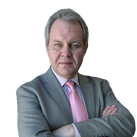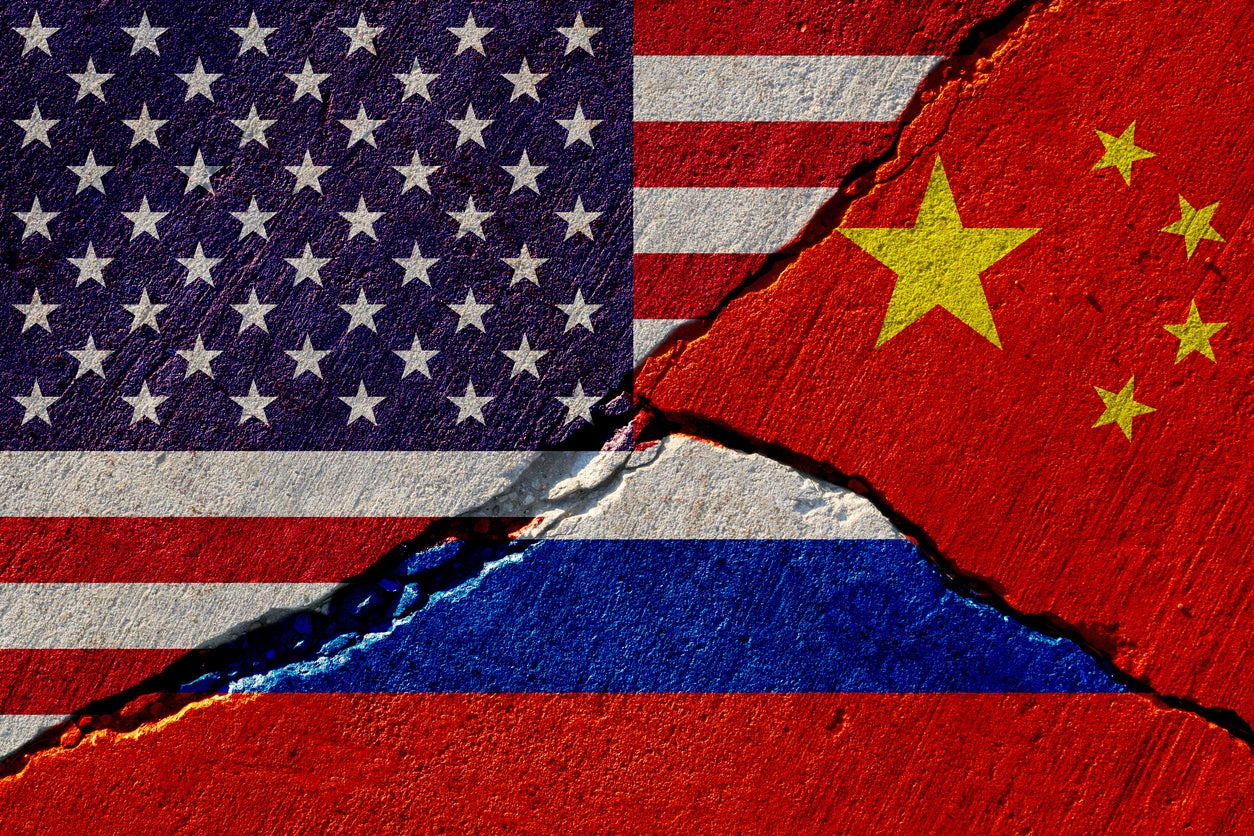The world today resembles the Cold War years – but smaller states are becoming evermore powerful
The biggest challenge the world faces is a desperate lack of trust. It might be the right time to look for new crucial points on the global map where senior leaders can meet with ease


Your support helps us to tell the story
From reproductive rights to climate change to Big Tech, The Independent is on the ground when the story is developing. Whether it's investigating the financials of Elon Musk's pro-Trump PAC or producing our latest documentary, 'The A Word', which shines a light on the American women fighting for reproductive rights, we know how important it is to parse out the facts from the messaging.
At such a critical moment in US history, we need reporters on the ground. Your donation allows us to keep sending journalists to speak to both sides of the story.
The Independent is trusted by Americans across the entire political spectrum. And unlike many other quality news outlets, we choose not to lock Americans out of our reporting and analysis with paywalls. We believe quality journalism should be available to everyone, paid for by those who can afford it.
Your support makes all the difference.With the pandemic easing in Europe and North America, the world looks ready to return to the geopolitical struggles of recent years.
For around two decades now, the great powers have seemed to be on a collision course. The United States pulled out of the Anti-Ballistic Missile Treaty in 2002 and from the Intermediate Range Nuclear Forces Treaty in 2019, citing their violations by Russia in both cases as the reason. Russia first suspended its membership of the Conventional Forces in Europe Treaty in 2007 and later completely abandoned it in 2015. Moscow invaded Ukraine in 2014 and followed Washington in denouncing the Open Skies Treaty.
All three superpowers – the United States, Russia, and China – allocate more and more money to military purposes. In constant dollar terms, their defence budgets grew by 1.6, 2.6 and 5 times since 2001, respectively.
The arms race enters outer space once again, hypersonic missile systems have been developed, and the Chinese fleet has become the strongest in Asia. Both Moscow and Beijing are supporting their client regimes: from unrecognised statelets in Donbass and Abkhazia to Venezuela, and from Pakistan to Myanmar. The progress in democratisation has reversed, with the most notable retreats in Belarus and Hong Kong. Russia and China have made bold claims on neighbouring lands in Eastern Europe and the South China Sea.
The biggest challenge the world faces these days is a desperate lack of trust. All the great powers have been behaving unpredictably, everyone believing that the others are conspiring against them. Few guarantees are taken seriously; global politics will become regionalised, with leaders talking almost exclusively to their loyal friends.
The world today resembles the Cold War years, when both the Western and the Communist leaders met often and cooperate intensively – while the summits between East and West happened rarely.
For a few months, some experts thought that all this might change – at least a bit. Almost immediately after moving into the White House, President Joe Biden extended the 2010 US-Russia New Strategic Arms Reduction Treaty, signed by presidents Barack Obama and Dmitry Medvedev, for five more years.
After some harsh exchanges with President Vladimir Putin, Biden expressed his wish for “de-escalating” relations with Russia as the first summit between American and Russian leaders since 2018 is now being prepared. In the early summer, the two leaders are expected to meet somewhere in Europe, presumably after the upcoming G7 summit in Cornwall in mid-June, but the exact location hasn’t been announced yet.
The G7 leaders may meet with several Asia-Pacific leaders, including the president of South Korea and prime ministers of India and Australia. There’s no doubt G7 leaders are concerned with the developments around China, and the proposed withdrawal of American troops from Afghanistan will be debated as well. In coming years, the centre for geopolitical debate may drift eastwards – and the sooner it shifts there, symbolically, the better, since such a move may balance the interests and aspirations of all great powers.
The Kremlin these days is looking for a kind of a “neutral” location that may suit both the Americans and the Russians. To break the mould of the Cold War-style East-West summits in Geneva, Vienna or Helsinki, it might be better to shift the geographic focus that prevailed over US-Russia summits. One of the most symbolic places for today’s geopolitics would be Kazakhstan’s capital Nur-Sultan (formerly Astana), the centre of a nation that has long ago proclaimed its multivector foreign policy and proved its commitment to it.
Kazakhstan is not Russia’s proxy despite membership in the Moscow-led Eurasian Economic Union. It has developed strong ties with China that outpace Russia in almost any sector of economic cooperation. The Kazakh political elite is painfully aware of both Russian and Chinese powers. Several Russian officials recently made claims on a part of Kazakhstan’s territory; the Russian foreign minister had to apologise for it quite recently. On the other hand, the Chinese economic influence, streaming from the realisation of Belt and Road initiative (BRI), is growing in Kazakhstan, making many locals feel uncomfortable about the country’s future.
Yet, in the almost 30 years that have passed since the demise of the Soviet Union, President Nursultan Nazarbayev created the modern Kazakh state from what was once a Russian colony and later an autonomous republic inside the USSR. Nazarbayev had presided over a success story in the post-Soviet nation-building, although he remained a devoted proponent of both the post-Soviet integration (which he announced as early as 1992), and the pro-Western course Kazakhstan pursued for years. Kazakhstan is a part of Trans-Atlantic/European organisations like the Organisation for Security and Co-operation in Europe (OSCE), chairing it in 2010; it’s also tightly connected to Europe by numerous economic and financial links. Kazakhstan is now the only post-Soviet Central Asian nation that ships more than half of its exports to the European Union.
Nazarbayev also pioneered an international organisation that boosts trust and confidence among countries and brings them to work together – the Conference on Interaction and Confidence Building Measures in Asia is a multinational forum enhancing cooperation for promoting peace and stability. It was launched in 1999 and now unites 27 members including Israel and Iran, working together side by side in the forum and the committees. As well as other Central Asian nations, Kazakhstan is deeply concerned with the regional security issues and may become an indispensable ally to the Western powers after US forces leave Afghanistan as there is no doubt the region will need further American engagement aiming at a continuous fight against extremism and terror.
Kazakhstani leaders – both First President Nazarbayev, who now is considered the Deng Xiaoping of Central Asia, overseeing his country’s progress from behind the curtain, and President Kassym-Zhomart Tokayev, a career diplomat and former foreign minister – are experienced dealmakers. Nur-Sultan is a home for many high-level meetings and negotiations, like the first summits between Iranian diplomats and their counterparts that finally led to the JCPOA agreement on Iran’s nuclear program in 2015.
The so-called “Astana Process” brought together the competing Syrian political factions in search of a peaceful end to the local civil war. But the greatest message would be to bring the most crucial summit between Putin and Biden to a place positioned close to both China and Russia, while sending a clear signal that in the heart of Asia there is a land where senior Western leaders feel comfortable and confident. Three challenges – Russia’s growing imperial aspirations, China’s global rise, and the security threats that arise from the heart of the Muslim world – all might be addressed from a single place in post-Soviet Central Asia with a great symbolic significance.
As the world’s geopolitical centre of gravity shifts east, 21st century geopolitics will be different to that of the 20th century. As an Indian-American political thinker, Parag Khanna rightly observed a decade or so ago, that we’re living in a world where the balance between the great powers is crucially dependent on smaller states’ political leaning. It might be the right time to look for new crucial points on the global map to allow us to move forward.
Join our commenting forum
Join thought-provoking conversations, follow other Independent readers and see their replies
Comments